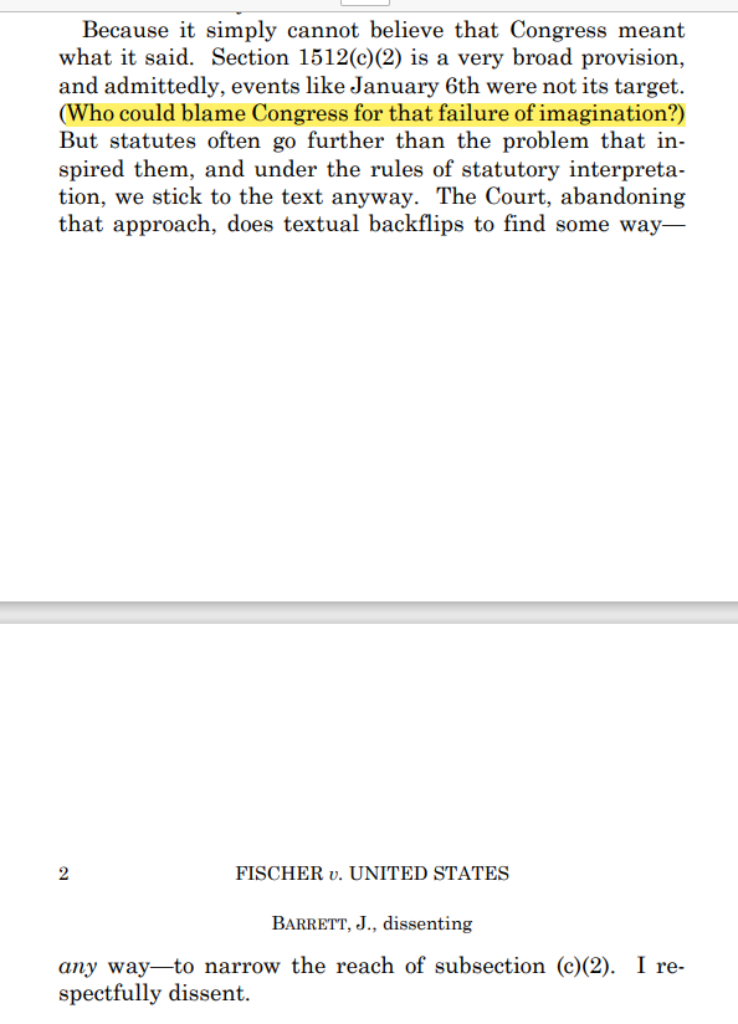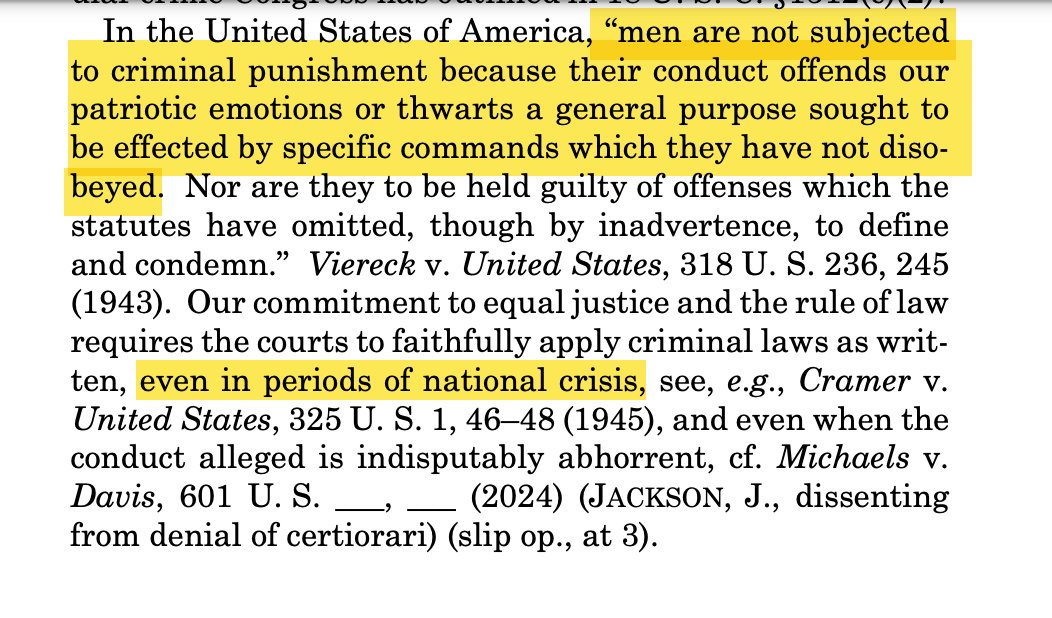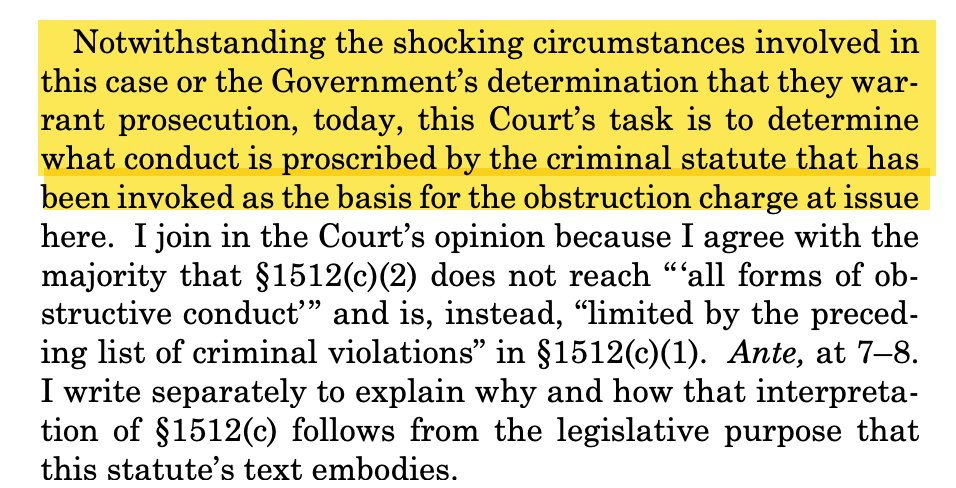Join the fight and contribute to our war chest.
Ditch the ads for $5 per month or $49 per year.
In a massive victory for J6 political prisoners and an unprecedented defeat for the corrupt Biden/Garland/Monaco/Graves DOJ, the Supreme Court has overturned the DOJ’s use of 1512(c)(2), obstruction of an official proceeding, in J6 cases.
In a massive victory for J6 political prisoners and an unprecedented defeat for the corrupt Biden/Garland/Monaco/Graves DOJ, SCOTUS has overturned the DOJ’s use of 1512(c)(2), obstruction of an official proceeding, in J6 cases.
THIS MEANS THE DEPARTMENT OF JUSTICE HAS UNLAWFULLY PROSECUTED 350+ AMERICANS FOR THEIR PARTICIPATION IN JANUARY 6–A FLAGRANT ABUSE OF THE LAW TO PUNISH THOSE WHO PROTESTED BIDEN’S ELECTION AND TO CRIMINALIZE POLITICAL DISSENT.
In a massive victory for J6 political prisoners and an unprecedented defeat for the corrupt Biden/Garland/Monaco/Graves DOJ, SCOTUS has overturned the DOJ's use of 1512(c)(2), obstruction of an official proceeding, in J6 cases.
THIS MEANS THE DEPARTMENT OF JUSTICE HAS UNLAWFULLY…
— Julie Kelly 🇺🇸 (@julie_kelly2) June 28, 2024
It’s a massive victory and a very good day for patriots everywhere. Justice Ketanji Brown Jackson joined the conservatives in overturning the DOJ’s unlawful overreach on the statute, while Amy Coney Barrett inexplicably joined the dissent in another black eye for her appointment.
Roberts for 6-3 court: “The Government’s theory would also criminalize a broad swath of prosaic conduct, exposing activists and lobbyist to decades in prison. Our usual approach in obstruction cases has been to “resist reading” particular sub-provisions “to create a coverall statute.” Yates, 574 U. S., at 549 (plurality opinion). Nothing in the text or statutory history gives the Court a reason to depart from that practice today. And the Government’s interpretation would give prosecutors broad discretion to seek a 20-year maximum sentence for acts Congress saw fit to punish with far shorter sentences. By reading (c)(2) in light of (c)(1), the Court affords proper respect to “the prerogatives of Congress” in carrying out the quintessentially legislative act of defining crimes and setting the penalties for them. United States v. Aguilar, 515 U. S. 593, 600. 64 F. 4th 329, vacated and remanded.”
ACB joins DISSENT.
KBJ joins Roberts, Thomas, Alito, Kav, Gorsuch.
Amy Coney Barrett again showed her dark side once again by joining the dissent. Is there more behind this move?
The dissent by ACB is a juvenile embarrassment. She is mimicking the words of DC judges who claimed the 4-hour disturbance at the Capitol was so unthinkable that Congress never envisioned that such an event would happen so 1512c2 applies.
Either a dunce or a pawn or both pic.twitter.com/miW2ss0Lpv
— Julie Kelly 🇺🇸 (@julie_kelly2) June 28, 2024
Here’s a closeup of the image Julie shared:

This is only Justice Amy Coney Barrett’s latest shameful salvo against Justice Clarence Thomas. News outlets like Slate are celebrating.
Amy Coney Barrett Sounds Fed Up with Clarence Thomas’ Sloppy Originalism
[…]
A minor dispute over a trademark registration erupted into a heated battle over originalism at the Supreme Court last week, splintering the justices into warring camps over the value and practicality of history in constitutional analysis. No surprise there—as the term accelerates toward a contentious finale, the tensions roiling major cases are bound to spill over into littler ones. What’s remarkable is who seized on this squabble over intellectual property to launch a scathing salvo against the conservative majority’s “laser-like focus” on “supposed history and tradition”: Justice Amy Coney Barrett, a conservative who presented as a true believer in originalism when joining the Supreme Court four years ago. Barrett’s latest opinion exudes disenchantment with the methodology, at least as it’s used by this court; it also suggests she has buyer’s remorse about signing on to Bruen, a significant expansion of the Second Amendment that’s arguably the most radical and unworkable “originalist” opinion she’s joined so far.
[…]
Vidal v. Elster, last Thursday’s decision, is not the kind of case that usually makes headlines. Steve Elster is a labor lawyer who wanted to trademark the phrase “Trump too small,” inspired by Sen. Marco Rubio’s crude debate joke about Donald Trump’s hands in 2016. The Patent and Trademark Office, however, refused to register the trademark, citing a law that bars trademarks made up of a name “identifying a particular living individual except by his written consent.” (Needless to say, the former president did not give his consent.) Elster sued, alleging a violation of the First Amendment. He pointed out that the Supreme Court has held that two similar provisions of federal law violate free speech, one that bars disparaging trademarks and another that bars “immoral or scandalous” trademarks. So, he argued, the prohibition against trademarks that use other people’s names—the so-called names clause—should also be declared unconstitutional.
The Supreme Court unanimously ruled against Elster, upholding the statute. But the justices fractured badly on the reason why, dividing more or less into a 5–4 split. Writing for the five men, Justice Clarence Thomas relied exclusively upon history (or his version of it) to resolve the case. Typically, he explained, laws that discriminate on the basis of content—that is, their “topic,” “idea,” or “message”—are subject to heightened scrutiny under the First Amendment. And by targeting trademarks that reference other people, the “names clause” is a “content-based regulation of speech.” But Thomas then declared that the law is not constitutionally suspect because it aligns with the “history and tradition” of the nation “since the founding.” Trademark restrictions “have always turned on a mark’s content” yet “have always coexisted with the First Amendment,” so they represent an exception to the usual constitutional limitations. Embarking upon a grand journey from the 1700s through today, Thomas presented a smattering of comparable laws from the past to demonstrate this “historical rule.” In short, he concluded, it has always been done, so it always may be done. Case closed.
In a separate opinion, Barrett agreed with Thomas’ bottom line but sharply disagreed with pretty much everything else. His history-only approach, she wrote, was “wrong twice over”: Thomas both botched the relevant history and failed to make a persuasive case for its use in the first place. Start with “the court’s evidence.” Thomas’ law-office history, Barrett explained, consists of “loosely related cases from the late-19th and early-20th centuries” that do not “establish a historical analogue for the names clause.” His analysis of these cases is shallow and often dubious; Barrett highlighted unfounded inferences in Thomas’ skim of the historical record, questioning his generalizations from a handful of archaic decisions. She also noted that Thomas declined to “fully grapple with countervailing evidence,” citing old decisions that cut against his conclusory assertions.
Clearly, Barrett is growing tired of her colleague’s bogus originalism: She also criticized his highly selective frolic through the archives in last term’s Samia v. U.S., questioning his reliance on a somewhat random “snapshot” of history to cut back protections of the Sixth Amendment. “The court overclaims,” the justice wrote then, risking “undermining the force of historical arguments when they matter most.”
MSNBC even has a new favorite Supreme Court justice: Amy Coney Barrett.
MSNBC legal correspondent Lisa Rubin praised U.S. Supreme Court Associate Justice Amy Coney Barrett over her “incisive” questioning in the presidential immunity and Idaho abortion cases.
The court ruled in favor of President Joe Biden’s administration by reinstating limits on Idaho’s near-total abortion ban that requires doctors to perform an abortion in emergency cases under the Emergency Medical Treatment and Active Labor Act (EMTALA). The state law bans all abortions except for those deemed necessary to save the life of the mother and in the case of rape and incest.
[…]
“Justice Barrett is a very incisive questioner for a reason to the extent if there’s anything to praise about her EMTALA decision, it’s that she really tried to narrow the disagreement between the two and there, she’s the vote that I’m looking in that presidential immunity decision. What’s she gonna do?” she continued.
Meanwhile, Justice Jackson delivered a blistering smackdown to the Department of Justice in her concurrence.
Incredible concurrence from Justice Jackson: “Our commitment to equal justice and the rule of law requires the courts to faithfully apply criminal laws as written” — a direct smackdown of Joe Biden’s Justice Department, AG Merrick Garland, and Jack Smith.
This is made far more…
— Benjamin Weingarten (@bhweingarten) June 28, 2024
Glenn Greenwald was likewise impressed with Justice Jackson’s concurrence.
Here's Ketanji Brown Jackson impressively explaining why she joined the court's conservatives (except ACB) to reject one of the key theories used to turn Jan 6 protesters into felons.
As she says, you can't just invent new laws to punish those you hate most, as was done here: https://t.co/Im9BUOWjPo pic.twitter.com/I9UFhm9w3q
— Glenn Greenwald (@ggreenwald) June 28, 2024
Here are Glenn’s screenshots:
Hopefully, this 6-3 majority decision, with the notable inclusion of Justice Jackson’s warning in her concurrence, encourages the lower courts to be more generally hesitant to accept novel Democrat legal theories that have been invoked for political prosecutions.
On the brighter side of things, freedom-loving Americans are celebrating this massive victory.
🚨BREAKING: SCOTUS has overturned the DOJ’s use of the Enron-era obstruction of an official proceeding in J6 cases, 1512(c)(2). The Court says 1512 was not used unlawfully when prosecuting President Donald Trump and 350+ J6ers. A massive win for restoring true justice in this country.
🚨BREAKING: SCOTUS has overturned the DOJ's use of the Enron-era obstruction of an official proceeding in J6 cases, 1512(c)(2). The Court says 1512 was not used unlawfully when prosecuting President Donald Trump and 350+ J6ers. A massive win for restoring true justice in this… pic.twitter.com/LHji0XPJJq
— Charlie Kirk (@charliekirk11) June 28, 2024
This decision is just one of many significant rulings we’re expecting soon, including the ruling in President Trump’s case.
The Supreme Court on Friday ruled that the Justice Department overstepped by charging hundreds of people who rioted at the US Capitol on January 6, 2021, with obstruction in a decision that could force prosecutors to reopen some of those cases.
At the same time, the high court ruled that the charge could be filed against the rioters if prosecutors are able to demonstrate they were attempting not just to push their way into the building but rather to stop the arrival of certificates used to count electoral votes and certify the results of the election.
The high court’s decision means that special counsel Jack Smith is likely to continue to pursue the same charge against former President Donald Trump.
Of course, CNN is putting on a hopeful face, trying to spin things positively. But it sounds like Jack Smith might be in hot water with his case against President Trump.
NBC has more on the latest news from the Supreme Court.
The ruling may not affect Trump’s case. Prosecutors said that even if Fischer wins, Trump’s conduct would still be covered by a narrower interpretation of the statute.
[…]
The court, which has a 6-3 conservative majority, has in the past been skeptical of prosecutors when they assert broad applications of criminal provisions.
[…]
While there are 247 cases of the more than 1,400 Jan. 6 cases that may be affected by Fischer, there are just 52 cases in which it is the only felony offense, and just 27 of those defendants are still serving a sentence. Most recently, Jan. 6 defendant Benjamin Martin was convicted on Wednesday of obstruction of an official proceeding, but he was also convicted of felony civil disorder and misdemeanor offenses.
Recently, judges have been factoring the pending Fischer decision into their sentencing decisions. If a defendant was convicted of another felony, like assaulting an officer, they have stated on the record that they would have reached the same decision regardless of the Supreme Court’s decision in the Fischer case.
So there you have it. Roughly 52 J6ers are no longer felons, and they’re celebrating wildly, while 27 of those 52 may be sprung from prison very shortly.
It's official. I just spent 3 years in prison for something that isn't a crime. #J6 #Fedsurrection
— Tim Hale – Criminally Funny J6er (@LouisofMonmouth) June 28, 2024
Texts pouring in from J6ers.
Here’s one pic.twitter.com/N8EUkNGoF4
— Julie Kelly 🇺🇸 (@julie_kelly2) June 28, 2024
Now, we wait and see how many J6 prisoners are finally freed and how many others have their unjust convictions tossed out. This is a great day for justice. Let’s hope it marks a step toward ending the regime’s unconstitutional lawfare against the American people.
The full PDF to this beautiful decision can be found here.
S
JOIN THE FIGHT — DITCH THE ADS — READ THE NEWSFEED — FOLLOW ON X — GAB — GETTR — TRUTH SOCIAL



Join the Discussion